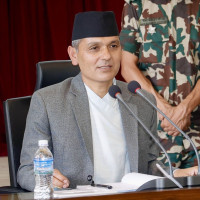- Friday, 20 February 2026
Need To Expedite Banking Reforms
Nepal Rastra Bank (NRB) has formed a three-member task force to recommend comprehensive reforms in the banking sector under the leadership of Dr Rebat Bahadur Karki. The taskforce has been given a one-month mandate to submit its report to the NRB. The taskforce will suggest measures for liberal yet prudent regulatory policies, risk-based oversight and development of customer-friendly banking services; explore ways to increase credit flows in rural areas, promote mergers and acquisitions as consolidation measures among banks and financial institutions and define the role of banking in the economy; and recommend strategies to help Nepal out of the Financial Action Task Force (FATF) grey list and assess the NRB’s coordinating role in the development of the capital market.
Nepal has been on the FATF grey list again owing to the country’s poor record in fighting money laundering and terrorist financing. Exiting the grey list is one of the challenges facing the government right now. If the country’s performance on anti-money laundering (AML) and combating the financing of terrorism (CFT) deteriorates, the country may fall into the FATF blacklist. So improvements in these regimes are exigent. However, the country has already embarked upon formulating strategies for exiting the FATF grey list. The NRB can make such strategies more effective and robust.
Banking sector expansion
The banking sector in Nepal has expanded since the 1980s when private-sector banks were allowed to operate in the country. Nepal Arab Bank (now Nabil Bank) is the first private-sector bank. Before this, there were just a handful of banks: Nepal Bank Limited, Rastriya Banijya Bank and Agriculture Development Bank. The number of commercial banks now stands at 20. It may be noted that during the mid-1980s, the first phase of banking reforms was launched. The reforms focused on promoting banks and financial institutions, liberalising the banking sector and enhancing the package of customer services. In fact, personalised banking services emerged with the launch of private-sector banks.
Besides, diversification and expansion of banking services also emerged in the market, extending the scope of the banking sector. The second phase of banking reforms was launched during the early 2000s. The reforms aimed at improving the regulatory framework, beefing up financial stability and enhancing operational efficiency. With the banks and financial institutions growing at the time, it was necessary to regulate them to maintain financial discipline and improve their services.
During the post-2010 period, financial consolidation was accentuated through mergers and acquisitions so as to consolidate banks and financial institutions to make them robust and resilient so as to enable them to withstand economic shocks such as the 2008 financial crisis. With the merger and acquisition process, the number of banks and financial institutions has drastically come down. Robust and resilient banks and financial institutions can effectively contribute to the economy by helping it achieve targeted economic growth. Nepali banks are resilient in a sense; they survived the COVID-19 pandemic even when other sectors of the economy faced one difficulty after the other.
However, the implications of the pandemic are manifesting themselves in the banking sector now. A large number of people are migrating abroad for jobs. Many businesses have been shuttered. Commercial banks have adequate deposits. Remittances are growing. But credit flows are dismal. Banks have reduced lending interest rates to woo borrowers; nevertheless, the credit front has not improved. As a result, liquidity is accumulating in the banking sector. The NRB is mopping up excess liquidity on a regular basis.
On the other hand, bad loans are also growing in the banking sector. The main sources of income for banks are loans. But when the rate of default on loan repayment is high, banks face problems. Bad loans, also called non-performing assets, grow when borrowers do not service their loans for more than three months. Accumulation of bad loans hits the profits of banks, degrading their performance. Further, growing non-banking assets are also a headache for banks. There is no asset management company to deal with challenges posed by bad loans and non-banking assets. The establishment of such a company is acutely felt.
On the other hand, as a result of reduced rates of interest on deposits, deposit-holders relying on bank interest for livelihoods have been hard hit. They are compelled to maintain deposits with banks for lack of other sectors where they can invest. As the banking sector is facing problems, the above-mentioned task force has been formed to suggest reform measures. The newly appointed NRB Governor, Biswo Nath Poudel, is working energetically to improve the banking sector. He is also seeking suggestions from finance experts and other stakeholders to bring out the monetary policy for the next fiscal year.
Financial crisis
It would be gratifying to note that no financial crisis has emerged in the banking sector. Such a crisis should be averted before it is too late. A financial crisis may not be confined to the banking sector alone; it may spread to other sectors of the economy as well. The financial sector mobilises and utilises financial resources effectively and helps notch up economic growth targets.
At present, the banking sector is going through a rough patch. The role of the banking sector is front and centre in the economy of the country. But when the banking sector itself is sluggish, it has not been able to contribute to the economy as much as it can. To revive and reinvigorate the banking sector, the government should also pay attention to improving other sectors of the economy, such as industry. In this context, the banking reform task force is expected to come up with recommendations on solid banking reforms, which should be earnestly implemented to bring about reforms in the banking sector for the benefit of banks, their customers and the overall economy of the country.
(Maharjan has been regularly writing on contemporary issues for this daily since 2000.)














